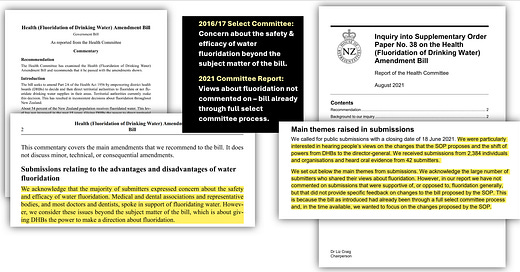Locking in Mandated Medicine by Short-Circuiting Democracy
When Select Committees make a habit of declaring public concerns about the safety of a mandated medicine are 'beyond the subject matter of the bill'.
It’s starting to look like New Zealand’s Ministry of Health makes a habit of undermining democratic process in order to skirt around inconvenient truths. The New Zealand Bill of Rights Act 1990 (BORA) could be collateral in the game that is being played. But it’s bigger than that.
Members of Parliament, officials at the Ministry, and affiliated agencies are prepared to write out public concerns about health risk from forced medicalisation in public consultation processes. The Ministry is aware that public trust is declining, because they’re constructing coercive frameworks to ensure that affected actors comply. No matter the evidence as to safety.
Mandating a medicine should require a higher bar because it impacts upon human rights. But the undermining of democratic process is greater than that. New Zealanders can observe poor process in laws passed requiring the fluoridation of drinking water as well as in the locking in of Covid-19 mandates in New Zealand.
In parallel we observed the weaponisation of selective science and exclusion of peer-reviewed science; a gaming of public submission processes; and the deployment of punishing consequences for those who do not acquiesce.
A November New Zealand High Court judgment concerned a decision to fluoridate drinking water. The then Director General of Health, Ashley Bloomfield, was found to have failed to take into account the New Zealand Bill of Rights Act 1990 (the Bill of Rights Act) which ensures the right to refuse medical treatment.
When a decision has the potential to restrict a fundamental right in BORA, officials must thoroughly consider that restriction and consider whether it is demonstrably justified in a free and democratic society.
The judge found that enforced fluoridation was a reasonable limit on rights; therefore the Director General made an error of law in failing to take into account and give due weight to BORA.
We might presume fluoridation of drinking water is, as Bloomfield maintained, safe and effective. Yet in order to arrive at this presumption, the Ministry of Health – and Parliamentary – processes and practices inevitably write out inconvenient considerations. By excluding important issues, or relevant considerations, risk of harm might be minimised. However, this occurred throughout Covid-19 as mandates rained down on healthy people.
Perhaps compulsory or mandated medicine is better described as command medicine.
Coercion is at the forefront. In the case of fluoridation, local councils that do not comply within the specified timeframe are faced with a fine of NZD200,000 and then NZD10,000 for each day the fluoridation equipment is not operative.
New Zealanders who resisted the BNT162b2 vaccine lost their jobs and their access to public places.

In the case of fluoride, the Crown was concerned with an ‘overburdening of the administrative decision-making process.’ But of course, process shapes outcomes. What we consider or don’t, what is relevant, is material to an outcome.
To keep reading - Please head over to Brownstone Institute.
Locking in Mandated Medicine by Short-Circuiting Democracy
https://brownstone.org/articles/locking-in-mandated-medicine-by-short-circuiting-democracy/




